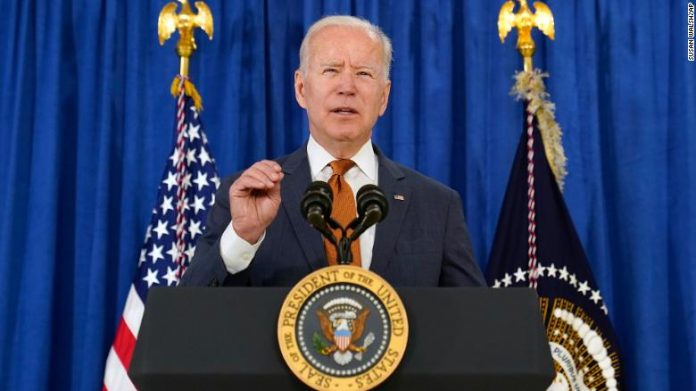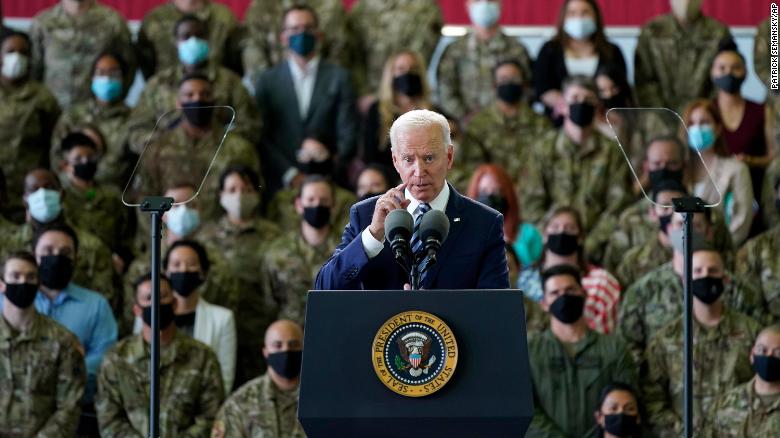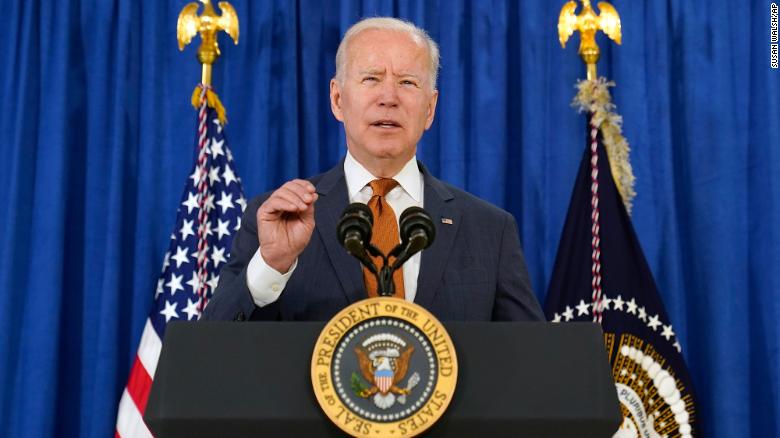Why Biden’s foreign trip is so unique and so important
Joe Biden’s first foreign trip as President comes at a unique moment.
No US President has ever left the nation’s shores with democratic values under attack as broadly and systemically at home as they are abroad. This extraordinary reality will complicate his mission to purge the trauma of the Donald Trump era and convince both foes and friends that the US is reclaiming its global leadership role for good.
Biden meets British Prime Minister Boris Johnson on Thursday before the G7 summit, makes a hop to NATO in Brussels, then has a summit with Russian President Vladimir Putin in Geneva that will evoke the most tense days of the Cold War.
“We’re going to make it clear that the United States is back and democracies of the world are standing together to tackle the toughest challenges,” Biden told US troops at an air base in eastern England on Wednesday.
For Biden, democracy is not just some abstract concept from civics class that Americans experience only when they enter the voting booth every few years.
It is a system, a way of life and a set of rules and norms that made the United States the strongest and richest country in history. The free, prosperous nations the US rebuilt and protected after World War II faced down communist tyranny in the form of the Soviet Union and underwrote 70 years of peace. This web of open, like-minded countries is also the key to America’s global power. If democracy ebbs abroad, so does US influence.
But now it is all under threat.
New challenges
The rise of a new superpower, China, determined to overhaul US riches and power is becoming a grave threat to democracy, and offers potential autocrats an alternative power template of one-party rule.
Russia — the adversary that Biden will confront at the end of his Europe trip — meddled in the last two US elections to help Trump, who often seemed to advance its foreign interests over America’s.
But the most extraordinary feature of Biden’s trip is that he’s not an American President going out to confront tyranny abroad — that’s happened before. He’s huddling with US allies at a moment when the greatest threat to democracy comes from within the United States.
The world looked on, horrified, at the insurrection against the US Capitol orchestrated by Trump in January. Since then, the ex-President has poisoned millions of Americans against democracy with his false electoral-fraud claims. Republican state lawmakers are quickly passing bills that make it harder for all but their own supporters to vote and make it easier to steal elections. The principle that voters have the right to pick their own leaders is under threat.
Trump’s method of undermining elections, weaponizing propagandistic news coverage, creating false realities, promoting cronyism and stigmatizing immigrants was painfully familiar to Europeans because of their own history and as autocracy again takes root in the former Eastern bloc.
Biden, who was born during World War II, when Nazi tyranny ruled Europe, and came of age in the Cold War, has identified a fateful moment. Often he doesn’t sound that convinced that the slumbering West can prevail against the threats to freedoms and global dominance of its values that it has taken for granted — especially when he is talking about China. And not even President Franklin Roosevelt had to worry about the state of democracy back home when he crossed the Atlantic for summits during World War II. In homage to Roosevelt, Biden will unveil an updated Atlantic Charter with Johnson on Monday — the document that FDR signed with wartime Prime Minister Winston Churchill created the bedrock of the West.
Biden is seeking to reinvigorate US alliances that for decades have looked backward to the glories of that era. The oldest President in US history is looking to the future.
“I believe we’re at an inflection point in world history,” Biden told American troops. He cited a “moment where it falls to us to prove that democracies will not just endure, but they will excel, as we rise to seize the enormous opportunities of the new age.”
And he offered his fellow leaders a warning before this weekend’s G7 summit on the rocky Cornish coastline.
“We have to discredit those who believe that the age of democracy is over, as some of our fellow nations believe,” Biden said.
A post-Trump boost
The new US President is assured of a warm welcome. After all, he’s not his predecessor, who berated allies like German Chancellor Angela Merkel, preferred the company of autocrats to allies and didn’t really believe in the West.
But the Trump presidency and the former President’s horrifying exit from power traumatized many of America’s friends abroad. It made some doubt that democracy can survive in the United States. Privately, diplomats from allied nations will concede that they are not completely convinced that Biden ended the populist nationalism of “America First.” Some fear he could be simply an interregnum and that Trump or a new president in his image could return in January 2025.
Part of the rationale of Biden’s trip is to begin to calm some of those nerves that raise concerns about US staying power. European nations do not need to agree with the United States on every policy issue. But after the upsets of the Trump era, which turned America from a force of global stability to one of disruption, they crave strategic certainty from Washington.
“What President Biden needs to do is show consistency, credibility, in US promises, and to really see this as stabilizing our alliance network both in Europe and in the Indo-Pacific,” said Heather Conley, senior vice president for Europe, Eurasia and the Arctic at the Center for Strategic and International Studies, at a briefing.
“Our allies will not believe this will hold, until they see in several election cycles that regardless of administration, US policy does see the benefit of alliances,” Conley said.
Still, political leaders are pragmatists. They understand that Biden, despite doubts about his capacity to pass the fullness of his agenda against Republican obstruction, has more than three more years in power. His goals on combating global warming and conquering the pandemic mirror theirs. There is every chance for a first successful foray overseas for the President. Biden’s trip opened Wednesday with the news that the US had bought 500 million doses of Covid-19 vaccines and would send them to nations unable to buy bulk supplies themselves. He has already rejoined the Paris climate accord, from which Trump withdrew, and the United States will be a crucial player in the next global climate conference, in Scotland in November.
While the President initially appeared to want to recruit European Union nations for a global compact against China, his team has cooled the rhetoric on the issue somewhat, recognizing that while it stands close to the US on democratic values, the EU doesn’t want to pick sides in a new cold war.
A showdown with Putin
The deliberate choreography of the visit situates Biden with US allies for almost a week in the United Kingdom and at NATO headquarters in Brussels before he sits down with Putin. If Biden is making himself the personification of global democracy, the Russian leader is the opposite. On Wednesday, a Russian court designated organizations affiliated with opposition leader Alexey Navalny as “extremist.”
Putin is a supporter of Belarus and its strongman leader, Alexander Lukashenko, which recently forced an airliner to land in order to effect the arrest of a prominent journalist and dissident. With his annexation of Crimea and incursions in Ukraine, he has returned the horror of contested borders to mainland Europe. More important from a domestic point of view, the US blames Russia for failing to crack down on ransomware cyber hackers who have targeted US food, water, transport and gasoline infrastructure in recent weeks. And then there’s Russian election meddling.
CNN has reported that Biden’s interest in a summit with the Russian leader was the subject of debate within his administration over the potential risks at a time when Washington-Moscow relations are at their lowest point in decades.
While the encounter is likely to feature tough talking — given that the core of Putin’s political project is to diminish US power, prestige and influence however he can — Biden was keen to go ahead. US officials hope to forge some common ground — on Iran nuclear talks and atomic weapons talks, for instance — despite the broader atmosphere of hostility.
Biden told the troops in England on Wednesday that he wanted to come face-to-face with Putin to “let him know what I want him to know.”
After waiting a lifetime to fulfill his dream of being President, Biden — who has traveled the globe as a senator and vice president carrying the messages of others — now has that duty with everyone he meets at a perilous moment for America’s power and the world it made.





